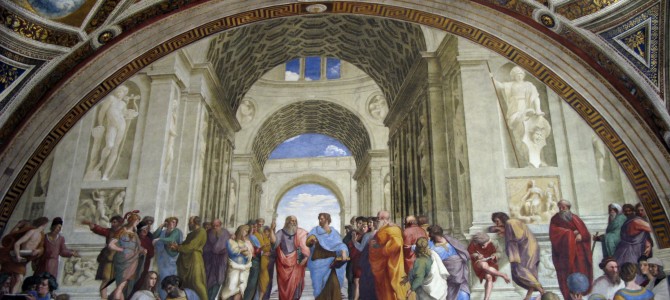In the third lecture of Hillsdale College’s course on the histories of Athens and Sparta, which you can follow along with here, Victor Davis Hanson, a history fellow at Hillsdale College, asks: “What is the chief virtue of Athens?”
The collapse of the Mycenaean’s ushered in a period of dark ages in Greek society during which the linear B script disappeared and illiteracy abounded. It is during these times that the Homeric epics, which told the story of men of an earlier age, were repeated throughout generations in order to preserve them. As these stories were passed along, these men took on godlike qualities and the stakes of the stories were raised to epic ones.
Around 800 B.C., city states began to develop in Greece. Of these city states, Corinth, Sparta, Thebes, and Athens were the largest. Attica was blessed with abundant natural resources they relied on — like clay and silver. It was also located near a sea port, which enabled them to trade and build a merchant fleet. Trade made the Athenian open-minded and helped him develop a liberal attitude that was open to other cultures, ideas, and ways of life.
Athens introduced the idea of a democratic form of government — that any person who owned a certain amount of land and served in the army could vote and participate in the political system. Power wasn’t held in the hands of one person, but was split evenly among those who were qualified to vote. This idea, that Athenian citizens were equal, was radically different from the way other societies operated. The system was not perfect, however. Popular courts needed a simple majority of a group of self-selected citizens to sentence a person to death. As a result, these courts were susceptible to volatility — a mob could gin up outrage and a death sentence one day only to be undone by a more temperate group the next day.
What Was It Like To Live In Athens?
Athens was primarily an agrarian society. Farmers frequently employed slaves who would help with field work and would travel to Athens frequently in order to buy goods and currency. Those who did not own land were able to secure a job as a bureaucrat. In other greek cities, non-landowners were typically forced to work as day laborers or indentured servants, but in Athens they could work overseeing that buildings were constructed a certain way, that currency was regulated, and that businesses employed ethical practices. This elaborate governmental system was funded by other cities who the Athenians asked them to pay for military protection from the Persians. Athens was also a tourist destination for other Greeks and the goods they sold to visitors offset the payroll expenses for these bureaucrats.
What resulted from this arrangement was effectively an empire — an empire ruled loosely by Athens. Many people from all over Greece would visit Athens to take in a play, which were often subsidized by the government, or to vote in a popular court.
The Decline Of Athens
Athens ultimately collapsed because the city could no longer sustain itself. The Peloponnesian War significantly drained their resources and the lack of a written constitution meant that there were no codified limitations on government. Excessive spending and draining societal obligations ultimately contributed to the city’s decline.
While the Athenians gave the world many things — a methodical approach to medicine, science, and advances in philosophy and literature — perhaps the greatest lesson we can learn from them today is what contributed to their demise. How did a great society like Athens, which developed democracy and equality, collapse inward? The answer is one worth pursuing — particularly for self-governing societies today.









